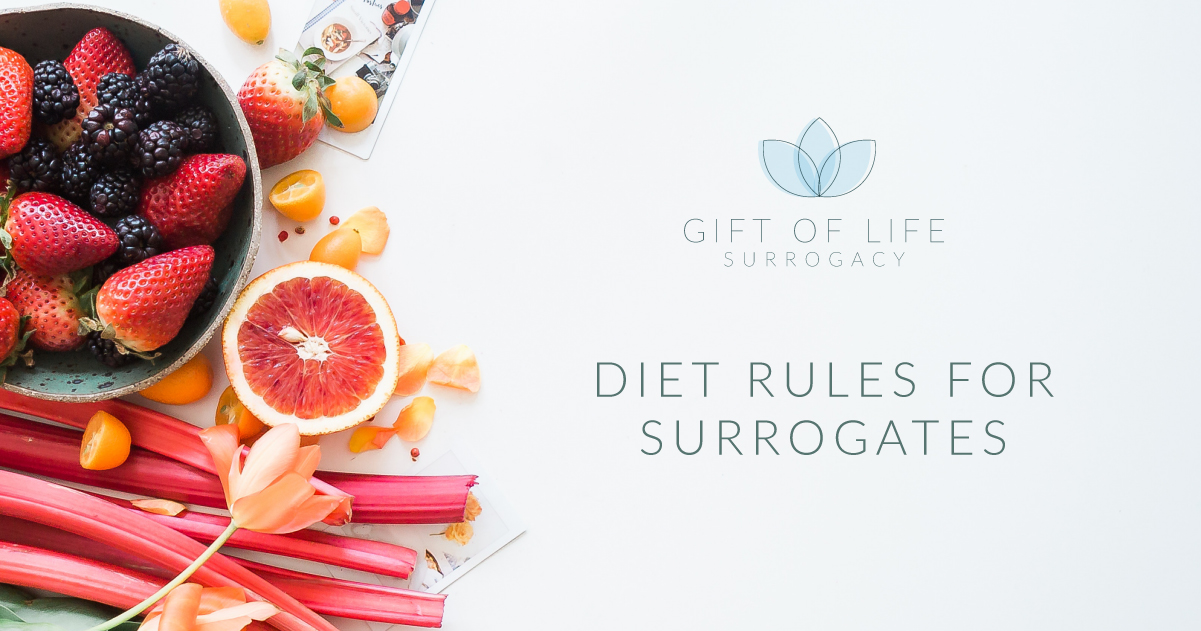Diet Rules for Surrogates
It is important that gestational carriers follow a healthy diet during their pregnancies. At Gift of Life Surrogacy, we suggest the following dietary guidelines to all pregnant women, not just gestational carriers.
Eat Organic
Eating organic is a way to ensure that your fruits, vegetables, meat and dairy products are produced without pesticides, fertilizers, antibiotics, or growth hormones. Since organic food can be more expensive, you can focus your attention to specific products that should be bought organic, if necessary.
Each year, the Environmental Working Group puts out their annual “Dirty Dozen” report, which shares the 12 dirtiest foods. To be on this list, foods tested positive for different pesticide residues and contained higher concentrations of pesticides than other produce. If you can only afford to buy some organic produce, be sure to make it these foods to limit your pesticide intake:
- Strawberries
- Spinach
- Kale
- Nectarines
- Apples
- Grapes
- Peaches
- Cherries
- Pears
- Tomatoes
- Celery
- Potatoes
Conversely, the 15 cleanest foods (where buying organic isn’t as necessary) are:
- Avocados
- Sweet corn
- Pineapples
- Frozen sweet peas
- Onions
- Papayas
- Eggplants
- Asparagus
- Kiwis
- Cabbage
- Cauliflower
- Cantaloupe
- Broccoli
- Mushrooms
- Honeydew melon
Eat Low-Mercury Seafood
Seafood is a great source of protein; however, due to mercury levels, a majority of seafood should be avoided by pregnant women. Seafood and fish with low levels of mercury, such as salmon or tuna, can still be consumed and are important to include in your diet for the high amount of Omega-3s. Omega-3s have been shown to prevent preterm labor and delivery, lower the risk of preeclampsia and may increase birth weight. If you’re looking to avoid all seafood, fish oil supplements are the best way to get Omega-3s.
Eat Fat and Fiber
Fat and fiber are important nutrients for a well-rounded diet, but they are especially important for reducing short-term pregnancy complications. Fiber is important to help with constipation, which is a common symptom in pregnancy due to the fact that pregnancy slows down your gastrointestinal system. Fats are essential for energy and cell growth. Examples of foods with good fats and fiber include avocados, beans, nuts, breads and grains.
Take Prenatal Supplements
Prenatal supplements and vitamins are important to take so you can ensure you’re getting all the nutrients you and your baby need. Combined with a nutritious diet, we recommend the following prenatal vitamins:
- 400 mcg of folic acid
- 400 IU of vitamin D
- 200 to 300 mg of calcium
- 70 mg of vitamin C
- 3 mg of thiamine
- 2 mg of riboflavin
- 20 mg of niacin
- 6 mcg of vitamin B12
It’s important to remember that vitamins should not replace a well-balanced diet but rather supplement it.
Stay hydrated
Dehydration can lead to premature labor, so drink plenty of water while pregnant. Water will also help the baby gain important vitamins and minerals. To further this, try to stay away from caffeine during pregnancy. Not only does caffeine cause you to be dehydrated, it also increases your blood pressure and heart rate, which are not recommended during pregnancy.
This blog is not intended to be a substitute for professional medical advice, diagnosis, or treatment. Always seek the advice of your physician or other qualified health provider with any questions you may have regarding a medical condition. Never disregard professional medical advice or delay in seeking it because of something you have read on Gift of Life Surrogacy’s website.

